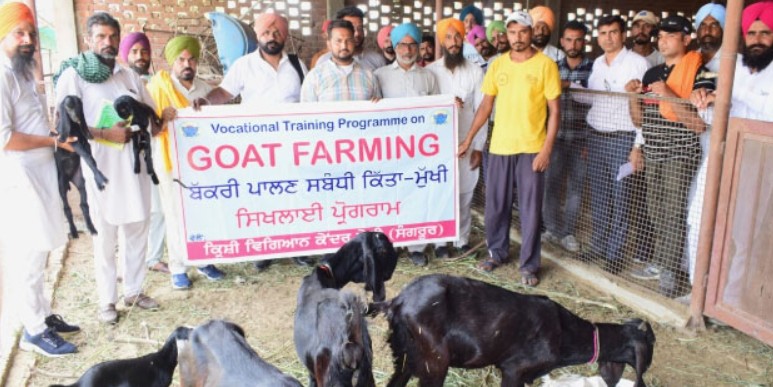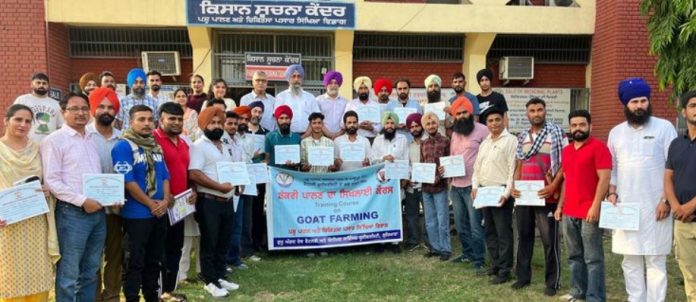The valedictory ceremony, held at the university, marked the culmination of a rigorous curriculum designed to cover every facet of modern goat rearing. Dr. R. S. Grewal, the esteemed Director of Extension Education at GADVASU, presided over the closing event, reaffirming the university’s unwavering dedication to empowering rural communities through livestock-based vocations. He passionately underscored the immense potential of goat farming as a powerful tool for economic empowerment and sustainable development, particularly in a state like Punjab where traditional agriculture faces increasing challenges.
The training program was meticulously structured to provide a blend of theoretical insights and invaluable hands-on experience. Dr. Jaswinder Singh, the Course Director and Head of the Department of Veterinary and Animal Husbandry Extension Education, highlighted the depth and breadth of the curriculum. Participants delved into critical aspects ranging from optimal housing designs and construction suitable for different climatic conditions, ensuring the well-being and productivity of the herd, to the intricacies of nutrition management, including feed formulation, fodder production, and the strategic use of concentrates to maximize growth and milk yield.
A significant portion of the training focused on reproduction and breeding strategies, teaching participants about selecting healthy breeding stock, managing breeding cycles, and ensuring successful kidding, which is crucial for herd expansion and profitability. The program also laid strong emphasis on animal healthcare, covering common diseases, their prevention through vaccination schedules, and basic diagnostic methods. Understanding biosecurity measures was another vital component, educating trainees on practices to prevent the entry and spread of diseases within their farms, thereby safeguarding their investment. The emerging challenges of zoonotic threats, diseases transferable from animals to humans, were also discussed, ensuring participants understood the public health implications and preventive steps.

Beyond the biological and veterinary aspects, the training embraced the commercial realities of goat farming. Experts provided crucial guidance on marketing strategies, helping participants understand market demand for goat meat (chevon) and milk, identifying potential buyers, and exploring avenues for value addition. Amisha Arora, Chief Manager of Punjab National Bank, delivered an enlightening session specifically on the financial schemes and loan processes tailored for livestock-based enterprises. This practical guidance on accessing credit and managing finances is indispensable for new entrepreneurs looking to secure their ventures.
A significant highlight of the program was the invaluable contribution of Baldev Singh Sandhu, a recipient of the Chief Minister’s Award in goat farming. Sandhu, a successful progressive farmer from Manuke Sandhu village in Ludhiana, shared his wealth of practical experience and hands-on insights into modern goat-rearing practices. His real-world examples, combined with his deep understanding of daily operational challenges and solutions, greatly enriched the trainees’ understanding and significantly boosted their confidence in pursuing goat farming as a viable livelihood. His success story served as a powerful inspiration, demonstrating the tangible benefits of adopting scientific methods.
The diverse group of 31 trainees, comprising mostly men with two women pioneers, hailed from various districts of Punjab, reflecting a growing statewide interest in diversifying agricultural income away from traditional crop cultivation. Goat farming offers several distinct advantages, including relatively low initial investment, a shorter gestation period compared to other livestock, and a high demand for goat meat and milk in both urban and rural markets. Goats are also hardy animals, capable of thriving on marginal lands and utilizing diverse feed sources, making them suitable for small and marginal farmers.
The positive feedback from the participants underscored the program’s effectiveness. Many expressed that the practical knowledge imparted would significantly contribute to enhancing rural livelihoods. They particularly appreciated the hands-on sessions and the direct interaction with university experts and successful farmers, which provided them with actionable insights rarely found in theoretical texts. The distribution of certificates upon successful completion served as a formal recognition of their newly acquired expertise, empowering them to embark on their entrepreneurial journeys with confidence.
GADVASU’s commitment to farmer education extends beyond goat farming, encompassing various other livestock sectors like dairy, piggery, poultry, and fisheries. The university regularly organizes such specialized training courses as part of its broader extension education mandate. These programs are crucial for transferring cutting-edge research and scientific advancements from the laboratory to the field, ensuring that farmers in Punjab are equipped with the latest techniques to improve productivity, ensure animal welfare, and enhance the profitability of their enterprises.
In an era where agricultural sustainability and economic diversification are paramount, initiatives like GADVASU’s goat farming training program play a pivotal role. They not only equip individuals with employable skills but also contribute to the larger goal of strengthening the rural economy, reducing dependence on a single crop cycle, and fostering a new generation of agricultural entrepreneurs. The successful conclusion of this training program in Ludhiana stands as a testament to the power of education and practical guidance in transforming rural livelihoods in Punjab.


